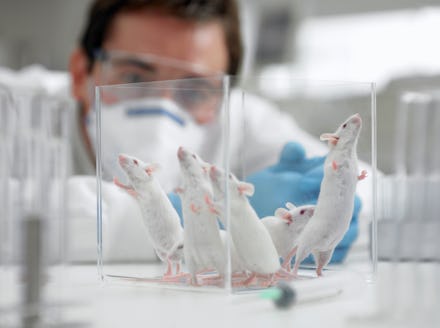Decades of Scientific Research May Be Ruined Because of Something Just Discovered in Mice

The news: Mice are a crucial part of lab research. Everything from their cells to their behavior is dissected in the name of science. Some of the biggest medical breakthroughs owe thanks to mice, but all that may come into question due to a shocking new discovery that threatens to blow apart decades of research.
Mice are more scared of male researchers than of female ones.
It sounds almost too comical to be true, but a new study published in the journal Nature Methods argues that mice's aversion to men is all too real — and it may have had incalculable impact on past research.
"People have not paid attention to this in the entire history of scientific research of animals," said Jeffrey Mogil, lead author of the study. "I think that it may have confounded, to whatever degree, some very large subset of existing research."
What does this mean? When you feel really stressed out or scared, you can become numb to pain — this holds true for humans and mice. The research indicates that in the presence of large male humans, mice become so scared that they experience little pain at all. And it may all have to do with smell.
Even when a male researcher was not present, "male-related stimuli induced a robust physiological stress response that results in stress-induced analgesia. This effect could be replicated with T-shirts worn by men, bedding material from gonadally intact and unfamiliar male mammals and presentation of compounds secreted from the human axilla," the study found. "Experimenter sex can thus affect apparent baseline responses in behavioral testing."
In addition to experiencing little pain, mice also demonstrated higher body temperature and levels of corticosterone, which are both indicators of stress.
But men shouldn't take too much offense — it's nothing personal. Mice happen to be very territorial creatures and they seem to have this stress effect when they encounter males of any species, not just humans. And since they can't really distinguish between species, "it's probably a little bit evolutionarily adaptive to have this effect until you can determine that a male that's around doesn't actually mean you any harm," Mogil said.
Why does this matter? Though it doesn't seem like mice have any kind of personal vendetta against human males, their stress responses are very real and may have tainted decades of research, and not just behavioral research.
"If you're doing a liver cell study, the cells came from a rat that was sacrificed either by a man or a woman," Mogil said. As a result, "its stress levels would be in very different states."
It's unclear how this finding will impact past research, but Mogil does have suggestions on how scientists can approach future studies. Male researchers can spend more time with the mice to acclimate them to the smell and journals can do a better job of reporting the sex of the researchers involved. Generally, one would think the sex of the scientists and researchers involved shouldn't be an issue, but Mogil's research seems to indicate otherwise. Ideally, both men and women would be present on a research team to see whether mice response is inconsistent, or, as Mogil jokes, to have the men "chaperoned by a woman."